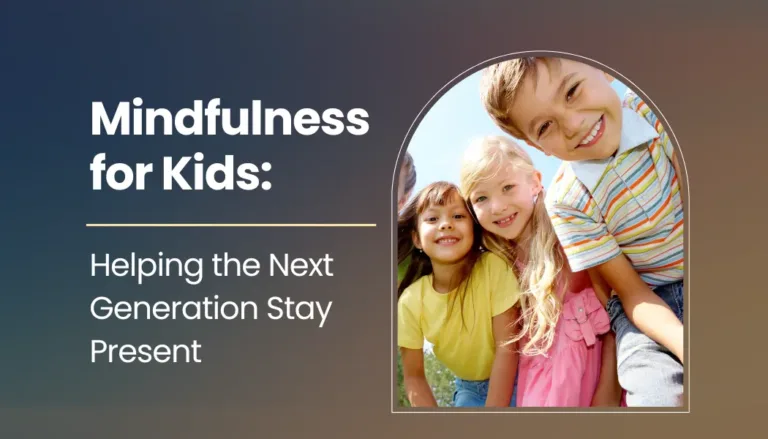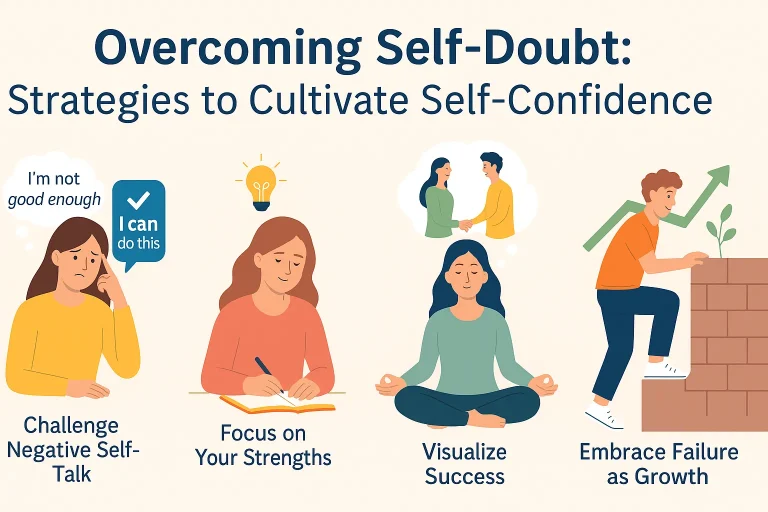Breaking Free from Autopilot Mode with Mindfulness
Introduction: Understanding Autopilot Mode In our modern, fast-paced world, it’s easy to operate on autopilot—going through daily routines without conscious awareness. We wake up, get ready, commute, work, check our phones, and repeat the cycle, often without fully experiencing life. Autopilot mode allows us to function efficiently, but it comes at a cost: we may miss meaningful experiences, neglect emotional needs, and accumulate stress without realizing it.
Introduction: Understanding Autopilot Mode
In our modern, fast-paced world, it’s easy to operate on autopilot—going through daily routines without conscious awareness. We wake up, get ready, commute, work, check our phones, and repeat the cycle, often without fully experiencing life.
Autopilot mode allows us to function efficiently, but it comes at a cost: we may miss meaningful experiences, neglect emotional needs, and accumulate stress without realizing it. Operating on autopilot can affect relationships, mental health, productivity, and overall satisfaction in life.
Mindfulness offers a way to break free from this unconscious state. By practicing present-moment awareness, we can reclaim attention, enhance emotional regulation, and live with intention and purpose.
This article explores what autopilot mode is, why it happens, the science behind it, and practical mindfulness strategies to regain control of your life.
What is Autopilot Mode?
Autopilot mode is a state of mind where actions become habitual and automatic. While habits save mental energy, relying too heavily on them can cause:
- Reduced awareness of emotions and thoughts
- Mindless decision-making
- Increased stress due to unprocessed feelings
- Difficulty appreciating small moments
Signs You’re on Autopilot
- Forgetting parts of your day or commute
- Eating, working, or scrolling without noticing
- Feeling disconnected from your emotions or surroundings
- Reacting impulsively rather than thoughtfully
Why We Go on Autopilot
Several factors contribute to autopilot behavior:
1. Habit and Routine
Repetition creates efficiency but can suppress conscious awareness. Our brains are wired to automate repetitive tasks to conserve energy.
2. Overstimulation and Information Overload
Constant notifications, multitasking, and rapid decision-making force the mind to switch to automatic mode to cope with cognitive demands.
3. Stress and Fatigue
When overwhelmed or exhausted, the brain defaults to autopilot to reduce mental strain.
4. Lack of Reflection
Without self-reflection or mindfulness practices, we rarely pause to evaluate thoughts, feelings, or actions.
The Science of Autopilot
Neuroscience explains autopilot through habit loops: cue → routine → reward. Repeated behaviors become automatic, engaging the basal ganglia, a brain region responsible for habit formation.
While autopilot frees cognitive resources, it can:
- Reduce self-awareness
- Limit creativity and problem-solving
- Increase stress through unprocessed emotions
- Contribute to emotional disconnection
Mindfulness activates the prefrontal cortex, responsible for decision-making, attention, and emotional regulation, helping us regain conscious control.
Benefits of Breaking Free from Autopilot
- Enhanced Awareness: Notice thoughts, emotions, and surroundings.
- Improved Decision-Making: Make choices intentionally rather than habitually.
- Reduced Stress and Anxiety: Address feelings before they accumulate.
- Better Relationships: Engage fully in conversations and activities.
- Increased Life Satisfaction: Appreciate small moments and cultivate gratitude.
- Boosted Productivity: Focused attention improves efficiency and creativity.
Mindfulness: The Key to Conscious Living
Mindfulness is the practice of paying attention to the present moment with intention and without judgment.
- Observing thoughts without reacting impulsively
- Noticing physical sensations, emotions, and surroundings
- Engaging fully with daily activities
By practicing mindfulness, we can interrupt autopilot loops, respond thoughtfully, and make conscious choices that align with our values.
Practical Mindfulness Techniques to Break Autopilot
1. Mindful Breathing
- Focus on the inhale and exhale
- Notice the rise and fall of your chest or the feeling of air in your nostrils
- Use for 1–5 minutes, even during stressful moments
Benefit: Calms the nervous system and anchors attention to the present
2. Body Scan Meditation
- Mentally scan the body from head to toe
- Observe tension, discomfort, or sensations without judgment
- Can be done lying down or sitting for 5–10 minutes
Benefit: Brings awareness to physical experiences often ignored in autopilot
3. Mindful Walking
- Walk slowly, noticing each step, the movement of muscles, and contact with the ground
- Observe sounds, smells, and visuals in the environment
- Can be practiced during short breaks or commutes
Benefit: Combines movement and presence, reducing mindless routine behavior
4. Mindful Eating
- Eat slowly, savoring taste, texture, and aroma
- Avoid distractions like phones or TV
- Notice hunger and fullness cues
Benefit: Enhances enjoyment, improves digestion, and increases awareness of eating habits
5. Single-Tasking
- Focus entirely on one task at a time
- Eliminate distractions and avoid multitasking
- Observe your thoughts and reactions while performing the task
Benefit: Increases focus, efficiency, and satisfaction with work or personal projects
6. Mindful Journaling
- Write about thoughts, emotions, and daily experiences
- Reflect on moments when autopilot behavior took over
- Identify patterns and triggers
Benefit: Builds self-awareness and emotional clarity
7. Pause and Observe
- Set reminders to pause for a few moments each hour
- Observe surroundings, breathe deeply, and notice your state of mind
- Use cues like phone notifications or natural breaks
Benefit: Interrupts habitual routines and promotes conscious engagement
Mindfulness in Daily Life
Even with a busy schedule, mindfulness can be practiced consistently:
- Morning Rituals: Take 2–5 minutes for mindful breathing or stretching before starting the day.
- Commute: Observe the environment, sounds, and sensations while walking or driving.
- Workplace: Take micro-breaks to stretch, breathe, or notice posture.
- Meals: Practice mindful eating, appreciating flavors and textures.
- Evening Reflection: Review the day, acknowledging moments of autopilot and intentional living.
Mindfulness for Emotional Regulation
Autopilot often leads to reactive behaviors, such as snapping at loved ones, overreacting to stress, or making impulsive decisions. Mindfulness helps by:
- Increasing awareness of emotions before acting
- Encouraging observation rather than judgment
- Creating a pause between stimulus and response
Example: Noticing frustration building during a work conflict allows you to respond thoughtfully rather than react impulsively.
Mindfulness and Relationships
- Enhances presence in conversations
- Improves empathy and active listening
- Reduces misunderstandings and conflict
- Encourages gratitude and appreciation
Example: During a family dinner, mindfulness allows you to truly engage, listen, and respond with intention, rather than being distracted by devices or thoughts.
Mindfulness for Stress Reduction
- Anchoring attention to the present prevents rumination about past events or future worries
- Reduces physiological stress responses like elevated heart rate and tension
- Encourages healthier coping mechanisms
Tip: Even a short mindful pause before a stressful meeting can calm nerves and improve decision-making.
Mindfulness and Productivity
Breaking autopilot enhances focus and efficiency:
- Single-tasking improves quality of work
- Mindful breaks prevent burnout
- Awareness of habits reduces wasted time and effort
- Encourages proactive rather than reactive work patterns
Example: Using a 5-minute breathing exercise before tackling tasks improves concentration and clarity.
Overcoming Barriers to Mindfulness
- “I don’t have time.”
- Use micro-practices: mindful breathing during commuting, short stretches, or 2-minute pauses.
- “I’m too stressed.”
- Mindfulness is most effective when stress is present, helping regulate emotions.
- “It feels awkward or forced.”
- Mindfulness is a skill developed gradually; start small and build consistency.
- “I can’t stop thinking.”
- Observing thoughts without attachment is the practice itself; the goal is awareness, not thought elimination.
Mindfulness Across Life Domains
career“>Work and Career
- Improves focus, decision-making, and creativity
- Reduces burnout and work-related stress
- Encourages intentional task management
Health and Well-Being
- Enhances awareness of physical sensations and health needs
- Encourages healthier lifestyle choices and body care
- Reduces stress-related illnesses
Relationships
- Fosters presence, empathy, and meaningful connection
- Improves conflict resolution and communication
Personal Growth
- Promotes self-reflection, clarity, and intentional living
- Encourages alignment of actions with personal values
Mindfulness for Children and Teens
- Enhances focus, emotional regulation, and resilience
- Reduces anxiety, stress, and behavioral challenges
- Can be practiced through breathing exercises, mindful coloring, or nature walks
Example: A 3-minute breathing or sensory awareness activity before homework improves concentration and mood.
Long-Term Benefits of Mindfulness
- Reduced stress and anxiety
- Improved emotional regulation
- Enhanced focus, creativity, and cognitive function
- Stronger relationships and communication skills
- Greater life satisfaction and well-being
- Reduced autopilot behavior and increased intentionality
Creating a Mindfulness Routine to Break Autopilot
- Morning: 5 minutes of mindful breathing or gentle stretching
- Commute: Observe surroundings or practice mindful walking
- Work: Take micro-breaks for breathing, posture check, or short meditation
- Meals: Eat slowly and mindfully without distractions
- Evening: Reflect on the day, journal, or practice gratitude
- Bedtime: Short body scan or mindful breathing for restful sleep
Tip: Start small, with just 5 minutes daily, and gradually expand to longer sessions as habits form.
Conclusion: Reclaiming Life from Autopilot
Autopilot allows efficiency but disconnects us from our own experiences. By incorporating mindfulness into daily life, we can reclaim awareness, regulate emotions, improve relationships, reduce stress, and live with intention.
Even short practices, like mindful breathing, walking, or eating, can disrupt autopilot patterns and promote clarity, focus, and well-being.
Start today: pause, breathe, observe, and engage. By consciously living, you can transform routine habits into mindful, meaningful experiences, breaking free from autopilot and embracing life fully.
Reclaim Your Presence and Bring More Awareness Into Everyday Life
If this article helped you understand how to break out of autopilot mode and reconnect with the present moment, here are more mindful reads that support clarity, calm, and intentional living:
- Mindfulness for Overthinkers: How to Get Out of Your Head – Practical techniques to slow the mind and return to what matters right now.
- Mindfulness Matters: Why Consistency Beats Long Meditation Sessions – Discover why small, steady habits create deeper awareness.
- Take What You Need: Choosing the Energy and Emotions That Serve You – A helpful guide to consciously shaping your inner world through mindfulness.
Want Gentle Daily Reminders to Stay Grounded and Present?
Positive Thoughts — A calming collection of uplifting reflections to help you pause, reset, and stay aligned with your mindful intentions.
The Positivity Collective
The Positivity Collective is a dedicated group of curators and seekers committed to the art of evidence-based optimism. We believe that perspective is a skill, and our mission is to filter through the noise to bring you the most empowering wisdom for a vibrant life. While we are not clinical professionals, we are lifelong students of human growth, devoted to building this sanctuary for the world.










